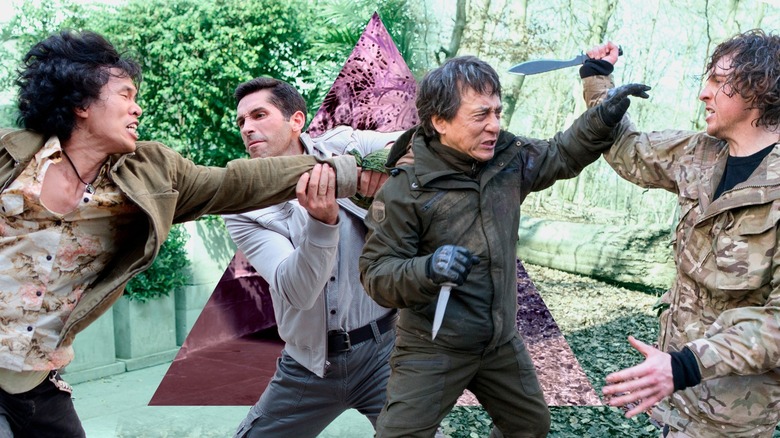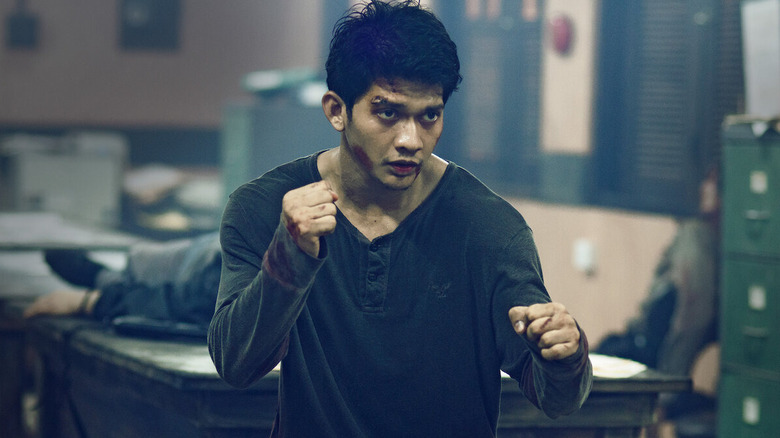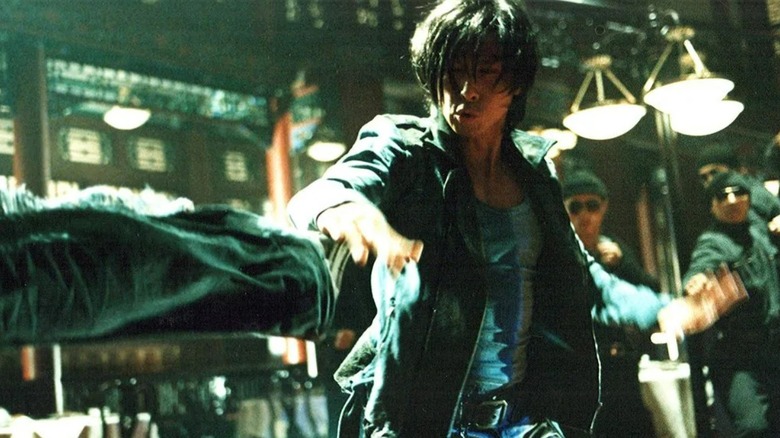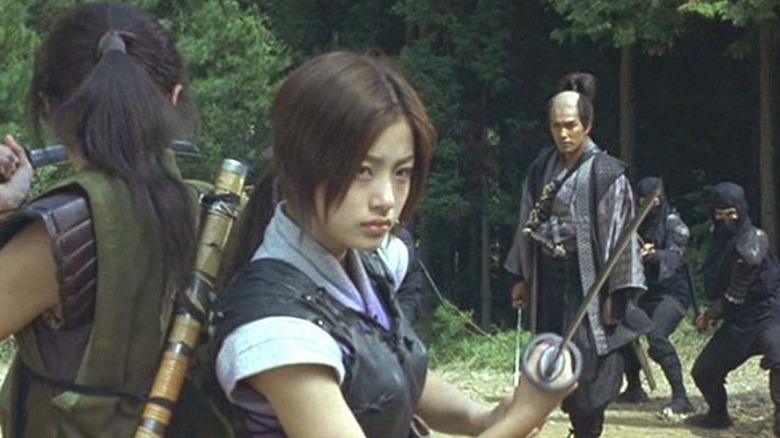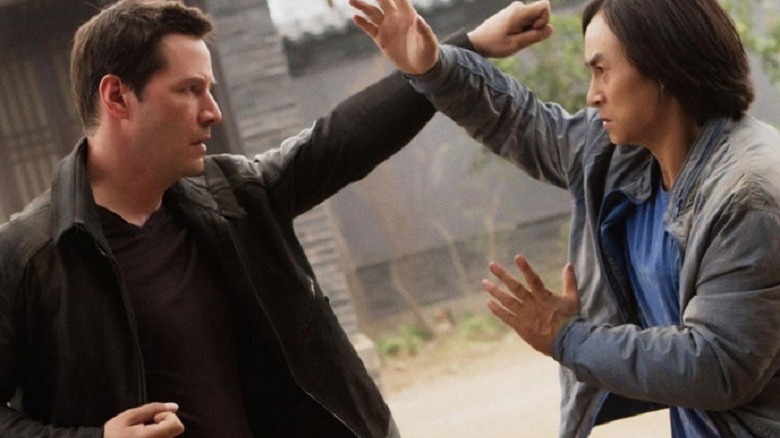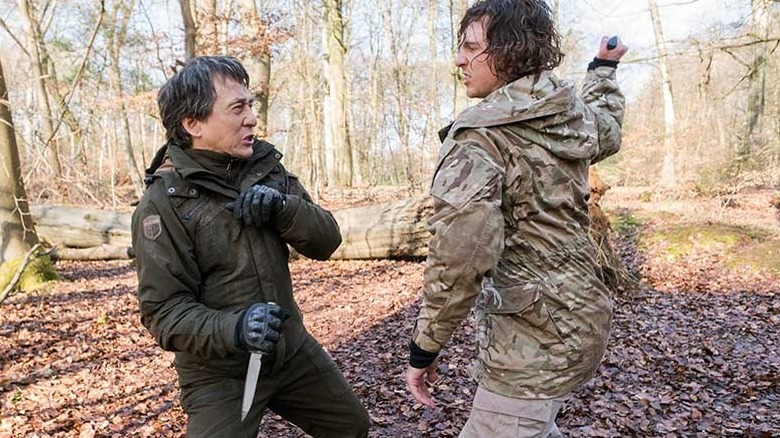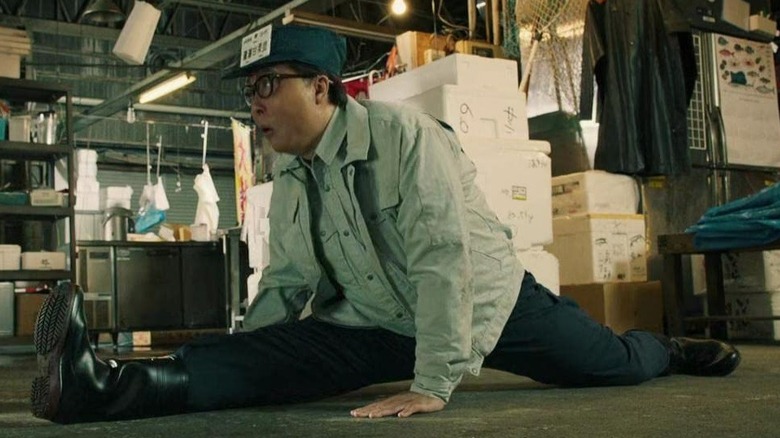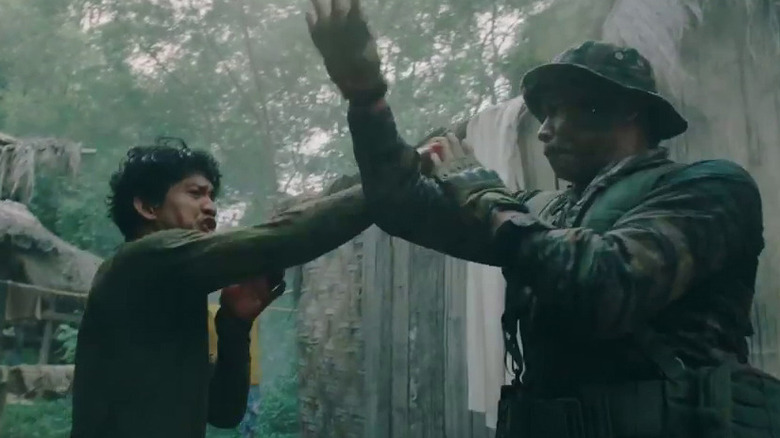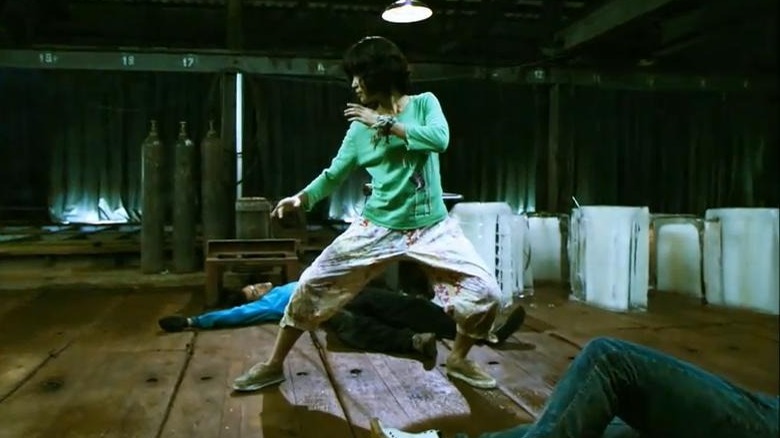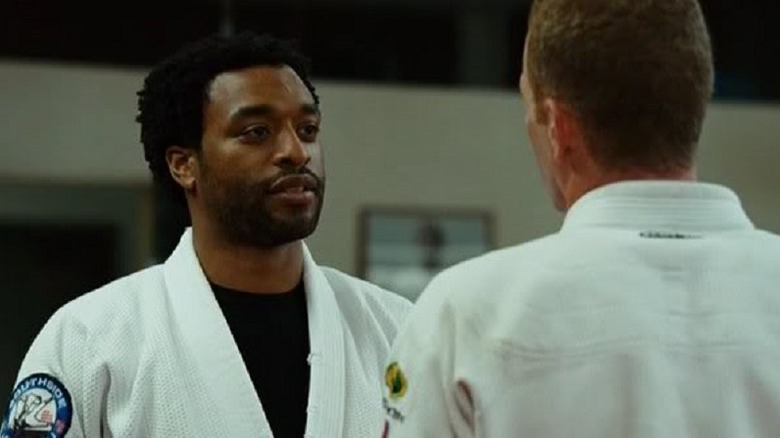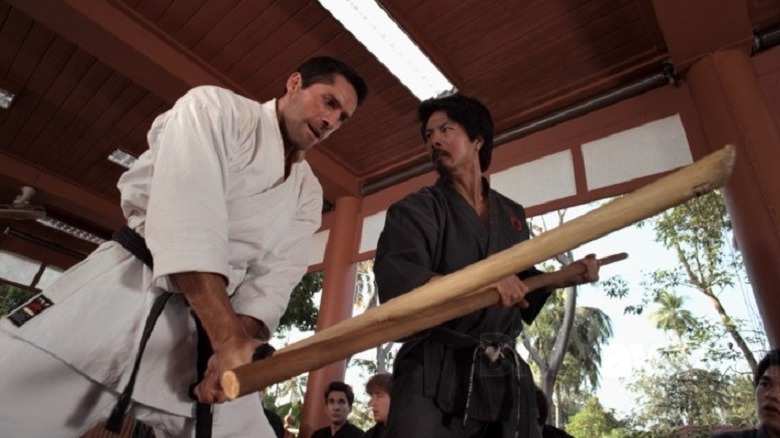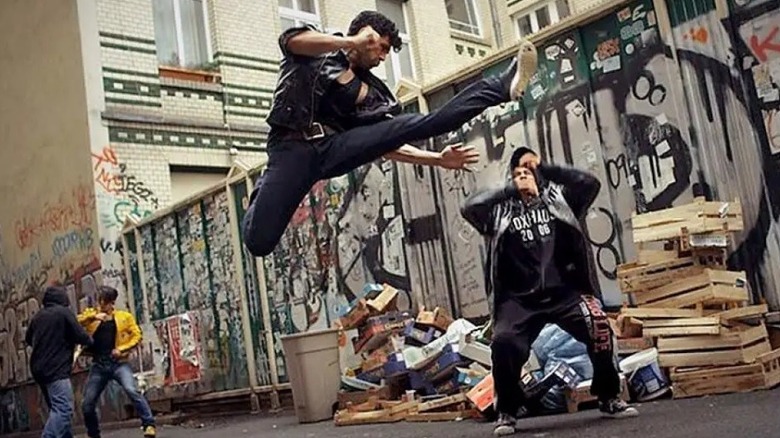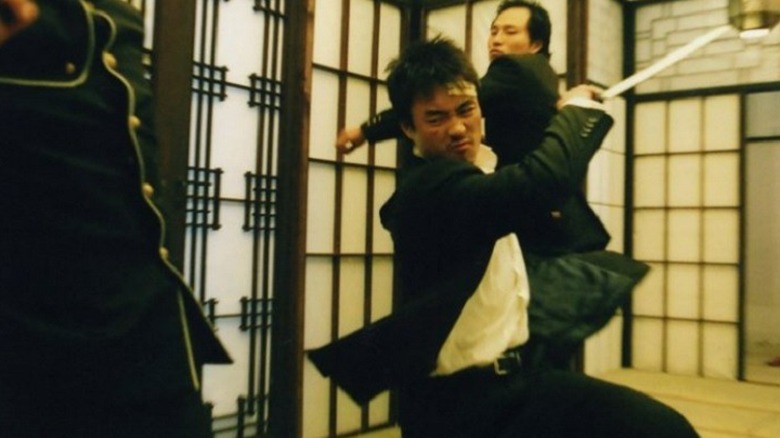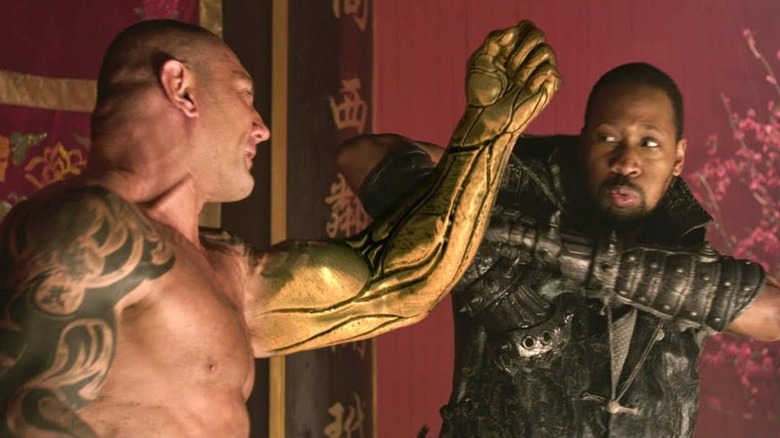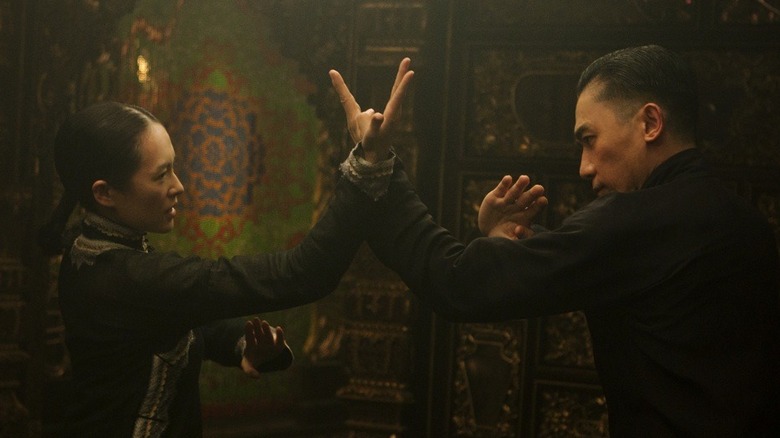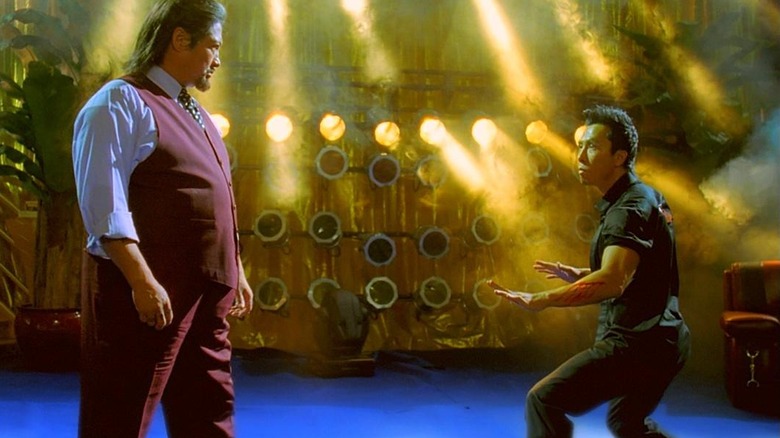The 15 Most Underrated Martial Arts Movies From The Past 20 Years
Though "Everything Everywhere All at Once" cleaning up at the 2023 Oscars might seem to betray this fact, martial arts movies generally aren't taken especially seriously by the filmgoing audience at large. It's a genre that is typically looked at as mindless fun, and while people can appreciate the occasional standout release like "Everything...," "The Raid" or "John Wick," most martial arts movies are only enjoyed and advocated for by huge fans of the genre.
Even those who profess to be lovers of martial arts films probably have trouble keeping up with them, as it is definitely a particularly prolific genre especially worldwide. It's the main genre in some regions, and movies that seemingly take place in other genres — comedy, romance, historical drama, et al — typically have some element of martial arts thrown in as well.
With that in mind, it's easy to have missed out on a lot of hidden gems over the years. But the last couple of decades in particular have seen a number of great martial arts films go overlooked, either because they were overshadowed by a more popular peer or simply because they just didn't find a particularly large audience for one reason or another.
Headshot (2016)
When you think about Indonesian martial arts movies, you probably think of the two installments of "The Raid" franchise. In addition to both being excellent films, they also made a star out of Iko Uwais, who went on to appear in American films like "Star Wars: The Force Awakens" and the G.I. Joe origin story movie, "Snake Eyes." But before that, he starred in another fantastic Indonesian movie that hasn't gotten as much attention as "The Raid" movies but definitely deserves it.
"Headshot" stars Uwais as a man who wakes up from a coma not knowing who he is and gives himself the name Ishmael. When his past finally comes knocking, it does so with punches and kicks, and Ishmael engages in one brutal battle after another as he pieces his memories back together. It's a movie that definitely isn't for the faint of heart, however, as the fights — and the resulting injuries — manage to be even more violent and wince-inducing than those in "The Raid" series.
Dragon Tiger Gate (2006)
Based on the Chinese comic, "Oriental Heroes," 2006's "Dragon Tiger Gate" obviously had to go by a different title when it was localized for the U.S. — not just because the original title is considered culturally insensitive, but because few people on this side of the pond have read the comic anyway. Directed by Wilson Yip of "Ip Man" series fame, "Dragon Tiger Gate" is the filmmaker's second collaboration with martial arts legend, Donnie Yen – the first of which will be discussed later in this list. Needless to say, the two work extremely well together and have collaborated on some of the best films in the genre in this century so far.
Here, Yen plays Dragon Wong, one of the two children of the founders of the titular martial arts academy alongside Tiger Wong (Nicolas Tse). Dragon grew up on the wrong side of the law, while Tiger followed a more law-abiding path, and fate brings the two strangers together one night in a thrilling restaurant battle. When they finally realize who they are to each other, they team up in a series of fights that often rely a little too heavily on CG but are still a joy to watch given the talent of the stars.
Azumi (2003)
It's something we've come to take for granted thanks to movies like "John Wick" and "Kill Bill" – the one-person army that mows down dozens upon dozens of foes in a brutal, bloody, and gleefully over-the-top fashion. But when it was done for the climactic battle in 2003's "Azumi," it was still somewhat novel, and the film deserves a lot of credit for paving the way for what has since become almost a cliché for the action genre.
Based on the manga series of the same name, "Azumi" stars the titular young girl (played by Aya Ueto) who is part of a group of orphans that were trained to become assassins. The novelty of it being a small-framed female taking down hordes of much bigger and tougher-looking men quickly wears off in the best possible way as you just enjoy the movie's incredibly well-choreographed action. Azumi isn't just "tough for a girl," she's one of the toughest protagonists of a 21st-century martial arts movie period. It's been said that this movie somewhat revitalized the martial arts genre as it had begun to stagnate around the turn of the century, and it's easy to see why.
Man of Tai Chi (2013)
The year before he became one of the most prominent action heroes of the 2010s with the first "John Wick" movie, Keanu Reeves stepped behind the camera for the first time — and thus far, only time — when he directed and starred in "Man of Tai Chi." Reeves' love of the genre is evident in every frame of this movie, feeling very much like an old-school martial arts picture and a very well-made love letter to an era of movies of which he is no doubt a huge fan.
Interestingly, Reeves is not only not the lead of the movie, he's actually the bad guy. He plays Donaka Mark, who owns a shady security firm and also oversees an underground fighting ring. Donaka takes notice of an impressive tai chi fighter named Tiger Chen Linhu (Tiger Chen), looking to take him under his wing. He initially doesn't want to fight for money, but circumstances leave him with no other option and he's soon earning piles of cash.
Tiger is definitely the star of the show here, previously a fight choreographer on "The Matrix" and "Kill Bill," and he proves to be just as compelling in front of the camera. Sure, the tai chi seen in the movie is far from authentic, but that's forgivable when the version of it on display is so fun to watch.
The Foreigner (2017)
Even though he'd always made serious movies alongside silly ones, the latter is what Jackie Chan is more famous for — especially in the west. But he's been making a concerted effort for his American fans to see him as a legitimate dramatic actor, first with his role as Mr. Han in the 2010 remake of "The Karate Kid," and later starring alongside Pierce Brosnan in the action thriller, "The Foreigner."
Directed by Martin Campbell of "007" fame — he previously worked with Brosnan on "Goldeneye" and later helped to successfully relaunch the franchise with "Casino Royale" — "The Foreigner" got a fair bit of attention and acclaim when it was released in 2017 and might not seem befitting of a list about underrated movies. But it is an underrated martial arts movie, with the 63-year-old Chan still participating in several scenes of expertly choreographed fights and a couple of impressive stunts.
The human drama of Chan's Quan Ngoc Minh, a quiet businessman driven to take vengeance into his own hands when his daughter is killed in a terrorist attack, is the real star of the show here and had critics praising Chan's acting chops. But when Chan does fight, he proves to still be a thrill to watch over 50 years into his legendary career.
Enter the Fat Dragon (2020)
With Chan moving toward more serious work in the last few decades, the martial arts comedy genre has suffered without its biggest star. Filmmaker and actor Stephen Chow initially picked up that mantle with "Shaolin Soccer" and "Kung-Fu Hustle," but he too all but abandoned the genre after those films. So what better way to inject some new life into that floundering genre than to remake one of its earliest classics — 1978's "Enter the Fat Dragon."
The original focused primarily on satirizing Bruce Lee's "Enter the Dragon" and "Way of the Dragon," and much of that spirit is a lot more present in the remake than you might think. But the new version also goes its own way, bringing things to a modern setting while still hearkening back to the feel of the original. While the 1978 film starred the already un-skinny Sammo Hung, the 2020 version puts Donnie Yen in prosthetics that round out mostly his face and belly, and it's not the best aspect of this movie. Issues with the use of a fat suit aside, "Enter the Fat Dragon" is a whole lot of fun, and Yen proves he could be in a lot more comedies if he wanted to.
Triple Threat (2019)
Despite the fact that it stars some of the most talented martial arts actors around — Tony Jaa, Iko Uwais, Tiger Chen, Scott Adkins, and Michael Jai White — you'd be forgiven for not giving "Triple Threat" a second look when you browsed past it in a bin full of cheap DVDs at a big box store. Because its generic title and cover art make it look like one of those bad direct-to-video action movies that get shuttled straight to the bargain bin, a lot of people overlooked this gem, even huge fans of the genre.
Everyone is bringing their A-game here, and considering the talent in this incredibly stacked cast, that is really saying something. The plot is admittedly nothing special and doesn't shy away from genre tropes — things are kicked off by the daughter of a rich and powerful man being in peril, the premise of about 300 other action movies — but that's not why you watch a movie like this.
The fight scenes are incredible, especially when more than one of the above-mentioned all-stars is involved at the same time. Any two of them in a fight would've been the epic climax of another movie, but the fact that there are multiple face-offs between two (or more) of these masters throughout this film ensure its spot as a must-watch for martial arts or action movie fans in general.
Chocolate (2008)
Sometimes referred to as "Zen, Warrior Within," "Chocolate" is much better suited to its original title as it more fittingly prepares viewers for an extremely unorthodox martial arts epic. In her debut performance, Yanin Vismitananda plays Zen, the daughter of a Yakuza boss, and his lover, Zin (Ammara Siripong). Zin eventually learns that Zen has autism, which she channels into her obsession with mimicking the moves of the students at the Muay Thai school that Zin has moved into, as well as classic martial arts films. That, combined with almost superhuman reflexes, leads to Zen becoming the ideal person to rescue her kidnapped mother from the clutches of her gangster ex-boyfriend who goes by the name of Number 8.
What ensues are some of the most elaborately staged and wholly original fight scenes ever put to film. Sure, the way the film addresses the autism of its protagonist (as well as a later character) with Tourette syndrome hasn't aged particularly well — and honestly wasn't all that sensitively addressed, to begin with — but if you can look past that, "Chocolate" is an excellent martial arts film whose star should be as well known as a fellow Thai action star, Tony Jaa, but hasn't yet gotten as many opportunities to shine.
Redbelt (2008)
Filmmaker and playwright David Mamet is best known for his acclaimed dramatic works like "Glengarry Glen Ross" and "The Untouchables," but he's taken a few well-received detours into action as well. His underrated 2004 action thriller, "Spartan," deserved to be a bigger hit, while not many people realized he wrote the screenplay for 1998's "Ronin" since he did so under a pseudonym.
Mamet also further cemented his aptitude for making overlooked action gems with "Redbelt," which stars Chiwetel Ejiofor who himself doesn't get the credit he deserves for being a talented action lead. Here he plays accomplished fighter Mike Terry, who shuns competitions or any other such commercialization of the martial arts. But he finds himself involved in the film industry after saving the life of famous action star Chet Frank (a surprisingly subdued Tim Allen), eventually having to reckon his personal ethics with his potential to do great things as a competitive fighter. While the action might take a backseat to the morality play going on at the fore, "Redbelt" still proves surprisingly competent in its fight scenes and delivers some extremely satisfying fisticuffs.
Ninja: Shadow of a Tear (2013)
Though the 2009 film, simply titled "Ninja," is also somewhat underrated, it did get a fair amount of buzz at least among fans of the genre and obviously did well enough to warrant a sequel. But while there are a few sequels among the all-time best martial arts movies — Chan's "Drunken Master II" says hello — it's generally agreed upon to be somewhat skeptical of martial arts sequels, especially American-made ones. With that in mind, "Ninja: Shadow of a Tear" was largely ignored upon release, which is unfortunate since it might actually be even better than the first movie.
Scott Adkins – one of the most consistent martial arts actors of the last 20 years who deserves to be as big of a name as any other action star working today — returns as Casey Bowman, who was attempting to settle down with his new wife after the events of the previous film. But when she is murdered, he embarks on a request for revenge which ends up pulling him back into his titular role. Not only are the fights incredible, but "Shadow of a Tear" is absolutely packed with them, predating movies like "The Raid" and "John Wick" that were praised specifically because of how much of their runtimes were taken up by action scenes.
Plan B (2016)
While Japan, China, South Korea, and the United States were long considered the main sources of top-quality action movies, the 2000s and 2010s have really seen an uptick in other countries staking significant claims in the genre. Thailand and Indonesia are arguably the two most significant new contenders for martial arts films of the last few decades, but Germany has also joined the fight, with 2016's "Plan B" proving that the country knows how to make a movie about flying kicks and punches as well as anyone.
It's not surprising that "Plan B" really delivers on the action once you release that its top-billed actors are not only stunt performers, but whose work includes the likes of franchises like "John Wick," "The Matrix," and "The Fast & Furious." These guys really know their stuff, and it's always nice when stunt workers get the chance to actually be themselves on screen rather than only getting to make other actors look cool while often risking their lives in the process.
The plot is fairly standard fare about the protagonists needing to fight their way to the rescue of a friend from gangsters, but whatever it takes to get the likes of Can Aydin, Cha-Lee Yoon, and Phong Giang plowing through bad guys is good enough. IMDb has a "Plan C" listed as in development, but take that with a grain of salt as it's difficult to find any other information about it elsewhere. Here's hoping, though.
The City of Violence (2006)
Speaking of South Korea, here's one that further proves why the country is one of the major players in the martial arts genre. Following his work as an actor for acclaimed South Korean filmmaker, Park Chan-wook, in two of the installments of the latter's "Vengeance trilogy," Ryoo Seung-wan has proven to be an accomplished director in his own right. He also stars in many of his own films, as he did for his excellent 2006 martial arts thriller, "The City of Violence."
Seung-wan plays Yoo Suk-hwan, one of four men who have reunited on the 20th anniversary of their friend's death. One of them decides that the friend's still-unsolved murder deserves to be investigated and sets about doing so. Soon, the investigation turns into a violent quest for revenge, on which Suk-hwan is joined by Jung Tae-soo (Jung Doo-hong).
The men basically become a two-man army as they kick, punch, and slice their way through hordes of goons on their path to vengeance in action scenes that are not only pulse-pounding but at times even funny, which is why Seung-wan is called "Korean cinema's answer to Quentin Tarantino" by Johnny Vaughan of The Sun. High praise indeed, but well deserved when he delivers films like this.
The Man with the Iron Fists (2012)
Tarantino has done such a great job at helping to keep the spirit of classic martial arts flicks alive through his "Kill Bill" movies, as well as '70s cult cinema in general through several of his other movies. If there is anyone who can lay claim to being as big of a fan of '70s kung fu movies and having built a career around that fandom, it's RZA of Wu-Tang Clan fame. Not only does his iconic rap group frequently reference classic martial arts cinema, but RZA has also parlayed that fandom into movies as well.
After spending some time playing small roles in other action movies as well as helping to score others — including "Kill Bill," as a matter of fact — RZA finally went all in on becoming a filmmaker with 2012's "The Man with the Iron Fists." It's very much in the same style as Tarantino's genre tributes, and though it obviously lacks some of the polish and craft of a Tarantino movie, it proves to be an impressive directorial debut.
With an extremely fun script co-written by fellow Tarantino friend and collaborator, Eli Roth, "The Man with the Iron Fists" is pure camp and doesn't try to be anything else. It's a must-see for fans of Wu-Tang, RZA, Tarantino, and or the era of martial arts films that everyone involved is so clearly enamored by. As a bonus, Dave Bautista shows up as one of the villains.
The Grandmaster (2013)
The "Ip Man" film series has pretty much locked down being the definitive fictionalized version of the life of Bruce Lee's teacher and mentor, and it's hard to top Donnie Yen as the title character. But those movies aren't the only time Man's story has ever been adapted to the big screen. In fact, between the second and third installments of the "Ip Man" series, acclaimed Hong Kong filmmaker Wong Kar-wai went ahead and did his own take on the fascinating story of the man.
No, "The Grandmaster" is no "Ip Man," and Tony Leung Chiu-wai — though a legend in his own right — can't quite compare to Yen, especially not in terms of martial arts prowess. But "The Grandmaster" is still worth a look, as it takes a more philosophical and introspective look at Man and the world events that were occurring around him in the 1930s and '40s rather than focusing on his greatness as a martial arts teacher and master.
But that's not to say that there aren't plenty of great fight scenes, because there most certainly are; courtesy not only of Leung but also Zhang Ziyi ("Crouching Tiger, Hidden Dragon") and Zhang Jin (who, interestingly enough, also appears in several "Ip Man" films) to name a few. It's definitely not better than any of the "Ip Man" films, but it's a great companion piece to that series that looks at the man and his story in a slightly different but equally interesting way.
Kill Zone (aka SPL: Sha Po Lang)
Any chance that "SPL: Sha Po Lang" might have had to be as big of a hit in the west as it was in its native Hong Kong was severely hamstrung when it was localized as "Kill Zone," as if the plan was to give it as generic and unremarkable of a title as possible. It's likely for that reason alone that so many English-speaking martial arts fans slept on the movie, despite the fact that it's one of the best action films in general of the last 20 years, stars legends Donnie Yen and Sammo Hung, and is directed by Wilson Yip of "Ip Man" fame.
The story involves a dying Hong Kong detective who is trying to get infamous Triad boss Po (Hung) behind bars as the last big accomplishment of his career. That mission is made a bit easier by Ma Kwun (Yen), who is being trained to be the detective's successor and who is known for his tendency to get a little excessive with his use of force.
Not only are the fight scenes expectedly excellent given the talent involved both in front of and behind the camera, but "SPL" is also an extremely compelling and well-made crime drama even apart from its action set pieces. 2015's "SPL II: A Time for Consequences" is a sequel in name only, though it's also fantastic and well worth checking out, swapping out Hung and Yen for Tony Jaa and Wu Jing.
